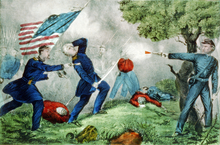Battle of Ball's Bluff
[4][ii] A false report of an unguarded Confederate camp encouraged Brigadier General Charles Pomeroy Stone to order a raid, which resulted in a clash with enemy forces.
Senator in uniform, and dear friend of the Lincoln family, Colonel Edward Baker, tried to reinforce the Union troops, but failed to ensure that there were enough boats for the river crossings, which were then delayed.
The Union losses, although modest by later standards, alarmed Congress, which set up the Joint Committee on the Conduct of the War, a body which would provoke years of bitter political infighting.
Three months after the First Battle of Bull Run, Major General George B. McClellan was building up the Army of the Potomac in preparation for an eventual advance into Virginia.
Stone then ordered Colonel Charles Devens of the 15th Massachusetts Infantry, stationed on Harrison's Island, facing Ball's Bluff, to send a patrol across the river at that point to gather what information it could about enemy deployments.
[11] Opting not to recross the river immediately, Devens deployed his men in a tree line and sent a messenger back to report to Stone and get new instructions.
Shortly before dark, a fresh Confederate regiment (the 17th Mississippi) arrived and formed the core of the climactic assault that finally broke and routed the Union troops.
Many of the Union soldiers were driven down the steep slope at the southern end of Ball's Bluff (behind the current location of the national cemetery) and into the river.
The official records incorrectly state that only 49 Federals were killed at this battle, an error probably resulting from a mistaken reading of the report of the Union burial detail which crossed over the next day under flag of truce.
The ensuing outcry, and a desire to learn why Federal forces had lost battles at Bull Run (Manassas), Wilson's Creek, and Ball's Bluff, led to the establishment of the Congressional Joint Committee on the Conduct of the War, which would bedevil Union officers for the remainder of the war (particularly those who were Democrats) and contribute to nasty political infighting among the generals in the high command.
Lt. Oliver Wendell Holmes Jr., of the 20th Massachusetts Volunteer Infantry, survived a nearly fatal wound at Ball's Bluff to become an Associate Justice of the Supreme Court of the United States in 1902.
Another outstanding young officer named Edmund Rice also eventually reached the rank of Brigadier General, was awarded the Medal of Honor and was fortunate enough to survive the war by near a half century.
2nd Lt. John William Grout of the 15th Massachusetts was killed in the battle; his death inspired a poem (and later a song) titled "The Vacant Chair".
The fictional Faulconer Legion is placed at the left flank of the Confederate position and led by Captain Starbuck's K Company, begins the rout of the Union forces.
[21] The poem, "The Vacant Chair" was written by Henry S Washburn to commemorate the death of Lt. John William Grout of the 15th Massachusetts Infantry, who was killed at the Battle of Ball's Bluff.


